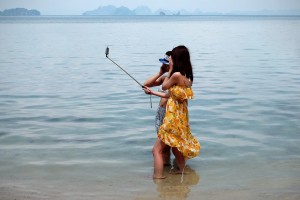Global tourism is big business. Billions of the world‘s travel dollars go to corporations from industrialized countries who operate resort complexes. Responsible travel is known as Alternative Travel, Green Travel, Ecotourism, Environmental Travel. Money and jobs from well-planned ecotourism programs provide conditions for developing countries to preserve their environment and heritage. Protected natural areas attract travelers. Socially responsible put dollars back into the developing countries to help the people, their cultural heritage, their physical environment and their future.
Why is socially responsible travel important?
• Indigenous cultures are threatened by the pressures of western culture and tourism.
• Vans packed with tourists impact wildlife. Migration patterns are disrupted, species decline.
• Locals are cutting forests to supply firewood for trekking groups.
• Natural areas are spoiled by tourists, poor facilities and waste disposal.
• Litter has become a major problem.
What can be done to preserve these tourism trends?
 Tourism can bring substantial economic gain to developing regions. Cultural and environmental groups can work to assure that tourism can maintain long-term benefits. Some measures include:• Join environmentally sensitive tour groups.
Tourism can bring substantial economic gain to developing regions. Cultural and environmental groups can work to assure that tourism can maintain long-term benefits. Some measures include:• Join environmentally sensitive tour groups.
• Travel with smaller groups – maximum of 14.
• Use local guides.
• Accept different cultures for their inherent worth.
• Curb tourist-caused wildlife abuse.
• Visit a rain forest. Lobby to save them for their long-term value.
• Purchase arts and crafts produced by the local community.
• Stay in locally-owned and operated hotels. Avoid resorts.
• Do not buy or sell cultural artifacts.
• Do not buy products made from wild animals.
• Support organizations that promote wildlife and preservation efforts.
• It possible, travel off-season to minimize the impact of high season travel.
• Donate money to local temples, schools and monasteries.
The impact of socially responsible travel
• Travelers experience the real culture and lifestyles.
• Enhances understanding across cultures.
• Tourist dollars help the local providers of services and products.
• Supports traditional lifestyles and helps to preserve traditions.
• Promotes environmental awareness and protection of natural resources.
• Promotes local projects in agriculture, water supplies, tree farms.
• Provides economic conditions to stop poaching of wildlife and to protect natural areas.
The impact of socially responsible travel.
- developing your intellectual skills;
- developing your social and communicative skills;
- improving your fitness habits if necessary;
- learning some essential skills for managing you personal resources?
How to create responsible travel for yourself?
- Learn about your destination: history, geography, culture, traditions. Find options for alternatives to the usual tourist hotspots.
- Use locally-owned business: hotels, restaurants, handicrafts.
- Learn about and be respectful of the ceremonies and sites of local people.
- Understand the unique customs for giving and receiving gifts.
- Be well-prepared but know there will be surprises and inconveniences.
- Get into as good physical shape as you can.
Positive experience requires that you be realistic about:
- the time and money you have to spend;
- the type of climate you enjoy;
- your emotional, physical and spiritual nee
 Oval Useful news from Azerbaijan and Caucasus
Oval Useful news from Azerbaijan and Caucasus


